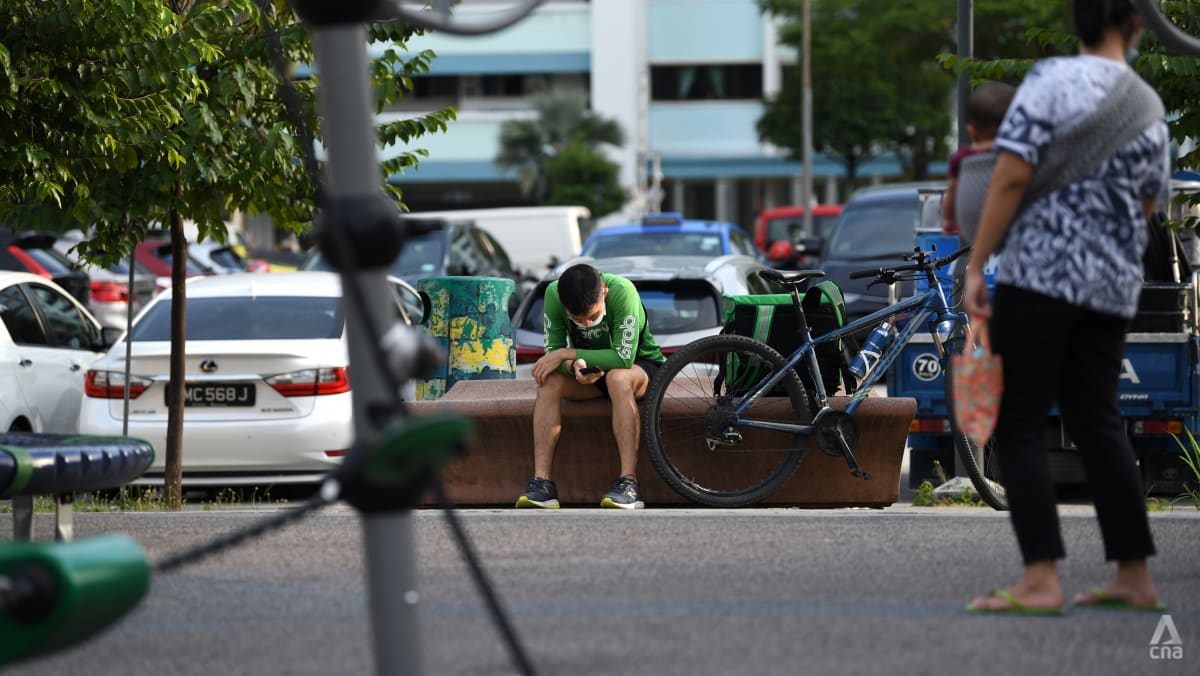SINGAPORE: They both became platform workers to earn money while between jobs. Then they found it more difficult than expected to make their next career move, but that’s where the similarities end.
Mr Kelvin Lee, 50, has made his living as a delivery rider for four years, while Raj (who asked not to be identified by his full name), 33, has been a private-hire driver for nine months.
The older man is a diploma-holder who spent most of his career in construction. He lost his contract job in hospitality in 2020, during the pandemic, and thought he would return to the industry after COVID-19 blew over. But Mr Lee found that his priorities had changed to wanting to spend more time with family.
He now earns S$3,000 (US$2,330) to S$4,000 a month working eight hours a day. He has no days off but estimated he works half the amount of time compared with his previous job, and for the same amount of money.
Mr Lee sees delivery work as a medium- to long-term job, and has accepted that he may be doing this until retirement, which he expects to be in his 60s or 70s.
Raj, however, was sure he’s only driving for the short term, after leaving a high-pressure job in sales at a digital analytics firm. He now earns about S$6,000 a month driving every weekday and half-days on weekends.
The graduate was bullish about eventually moving on to a full-time job in digital marketing or business development. He said he was holding out for an expected salary of S$10,000 a month – what he used to draw.
Raj and Mr Lee are part of a varied group of around 70,000 platform workers in Singapore.
Earlier in September, Singapore passed legislation to become one of the first countries in the world that recognises platform workers as a distinct category, and strengthens their rights.
Their protections now span greater contributions to the compulsory Central Provident Fund (CPF) savings plan – including from employers – as well as mandatory work injury insurance coverage and improved representation in industrial negotiations.
With these moves, especially to better cover retirement and housing needs through CPF, questions have been raised about whether platform work has become a sustainable, even lifelong career option.
GOING IN WITH “EYES WIDE OPEN”
Mr Lee is content with his delivery work because his financial commitments are light; he’s earning more than he would in other jobs; and he doesn’t expect much career progression at his age. He’s also confident that platform jobs will not dry up.
But he wouldn’t recommend young people be full-time platform workers. “There’s no career progression, and there’s always a limit (to what) you can earn.”
Raj was just as concerned for young, better-educated platform workers.
“I do worry about people who have studied, who could contribute in a much larger fashion to the economy, but are deciding to just continue driving private-hire (vehicles) because they enjoy the flexibility of this job,” he said.
He knows two drivers who are graduates, one with a master’s degree, who have stayed on despite not initially approaching platform work as a first choice.
Aged around 30 and unmarried, these friends of Raj’s are content to keep at it as they also have no family-related commitments nor expenses yet.
While some treat platform work as transitional, a substantial portion see it as a long-term career choice, said Dr Mathew Mathews, principal research fellow at the Institute of Policy Studies (IPS) and head of its Social Lab.
“Sometimes because it has much lower barriers for entry, they find the earnings … comparable to other jobs, and they have a preference for work where you do not have to directly report to someone,” he added.
In parliament, Senior Minister of State for Manpower Koh Poh Koon talked about the precarity of platform work and the “finely balanced middle ground” struck between flexibility and support in the new suite of protections rolled out by the government.
But platform workers have already expressed concerns about the impact of higher CPF contributions on their take-home pay. Some have said they would not opt into the scheme, which is mandatory only for platform workers turning 30 or younger in 2025.
Since 2020, the Land Transport Authority has set a minimum age of 30 to apply for the vocational licence for private-hire driving.
Asked about the policy intent of the new protections, Dr Mathews, whose areas of research include platform work, said he did not think it was to nudge workers away from what is legitimate work that benefits the economy.
“However, the Bill does allow for some correction at least in perceptions to younger workers who may be keen to venture into full-time platform work based on the erroneous idea that platform work is much more lucrative than traditional work.
“That certainly seemed to be the case when earnings from platform work did not result in CPF deductions. Now, with CPF deductions, the average earnings for platform work and traditional technical work will not be too far apart,” he said.













